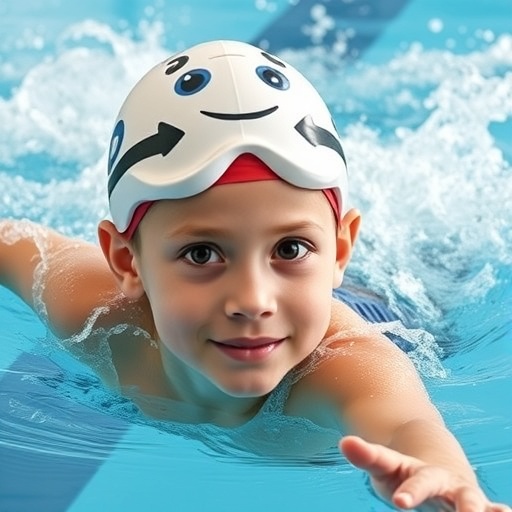In a groundbreaking exploration of the intersection between physical activity and cognitive functions, recent research led by Ding et al. has unveiled promising insights into the impact of swimming exercise on children diagnosed with Attention Deficit Hyperactivity Disorder (ADHD). The study, which is set to be published in BMC Pediatrics in 2025, delves into how structured swimming sessions may alter the functional connectivity in the brain’s right inferior frontal gyrus, a region pivotal for inhibitory control. This research not only broadens our understanding of ADHD but also highlights the potential benefits of exercise as a therapeutic intervention.
The right inferior frontal gyrus has long been associated with complex cognitive processes, including attention regulation and impulsivity control. In ADHD, children typically exhibit challenges in these areas, impacting their daily functioning and academic performance. This study specifically seeks to understand if engaging in swimming can enhance connectivity in this brain region, potentially offering children better mechanisms for managing impulsive behaviors.
To conduct the research, the team employed advanced neuroimaging techniques, including functional magnetic resonance imaging (fMRI), to measure changes in brain activity among participants before and after a series of swimming exercises. These measures provided a window into the dynamic nature of the brain networks involved in cognitive control, especially regarding how physical activity might stimulate neural circuits in children with ADHD.
The experimental design included a cohort of ADHD-diagnosed children who participated in an eight-week swimming program. Researchers meticulously tracked their performance in cognitive tasks, specifically those requiring inhibition and attentional control. As the children swam, not only were they improving their physical fitness, but they were also engaging in activities that appeared to influence their brain connectivity positively.
Interestingly, the baseline assessments revealed distinct neuronal activation patterns among the participants. Many children exhibited lower levels of functional connectivity in the right inferior frontal gyrus compared to their neurotypical peers, suggesting that this region’s functionality might be compromised in ADHD. This initial finding propelled the team to investigate whether these connectivity patterns could be altered through a regular, structured swimming regimen.
As the weeks progressed, participants showcased not only an increase in their swimming skills but also significant improvements in their cognitive performance on tasks involving inhibition. Follow-up fMRI scans indicated that with sustained physical engagement in swimming, there emerged a notable enhancement in the connectivity of the right inferior frontal gyrus. This enhancement signals a potential neuroplastic response to the regular exercise, suggesting that the brain can adapt and reorganize itself, even in children with ADHD.
The implications of these findings are profound. By effectively harnessing the benefits of swimming, which is often seen merely as a recreational activity, we can begin to view it through the lens of neurotherapeutic potential. The structured environment of swimming, paired with the cognitive demands it poses, appears to create a fertile ground for improving executive functions in children struggling with ADHD.
Moreover, this study aligns with a growing body of literature emphasizing the importance of physical activity for mental health. Previous research has consistently pointed out that exercise can lead to improvements in mood, anxiety levels, and overall cognitive functions in various populations. However, finding specific exercises that may elicit profound changes in brain structure and function, particularly for ADHD, provides new avenues for research and clinical practice.
As mental health continues to gain prominence in discussions surrounding child development and education, the integration of physical activity as a fundamental component of ADHD management becomes increasingly logical. This could pave the way for schools and caregivers to adopt more holistic approaches in supporting children with ADHD. Such strategies may not only involve medication and behavioral therapies but also incorporate physical activities like swimming as part of a broad-spectrum treatment plan.
Furthermore, the study’s findings could also influence future research directions. While this exploration primarily emphasizes swimming, it opens the door to evaluating other forms of exercise and sports in relation to ADHD. Could team sports, yoga, or dance reasonably alter brain connectivity in similar ways? The potential for further inquiry here is vast, presenting new opportunities for interdisciplinary studies bridging fields of psychology, neuroscience, and physical education.
In conclusion, the research conducted by Ding et al. presents a compelling case for the significance of physical activity in addressing cognitive deficits associated with ADHD. This swim-centric study not only enriches our understanding of ADHD’s neural correlates but also advocates for exercising as an accessible, enjoyable, and effective way to support children facing these challenges. While further research is necessary to corroborate these findings and explore the underlying mechanisms, the preliminary results are indicative of a promising pathway toward improved cognitive control and enhanced quality of life for children with ADHD.
As we look to the future, embracing a holistic approach that integrates physical health with mental wellness may indeed be the key to unlocking better outcomes for children grappling with ADHD and similar developmental disorders.
Subject of Research: The impact of swimming exercise on brain function in children with Attention Deficit Hyperactivity Disorder (ADHD).
Article Title: Altered right inferior frontal gyrus-based functional connectivity associated with inhibition through swimming exercise in children with attention deficit hyperactivity disorder.
Article References:
Ding, L., Zhong, W., Chen, L. et al. Altered right inferior frontal gyrus-based functional connectivity associated with inhibition through swimming exercise in children with attention deficit hyperactivity disorder. BMC Pediatr 25, 790 (2025). https://doi.org/10.1186/s12887-025-06196-1
Image Credits: AI Generated
DOI:
Keywords: ADHD, functional connectivity, swimming, cognitive control, right inferior frontal gyrus.




